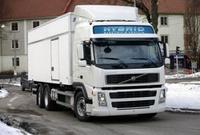Volvo one step nearer commercially-viable heavy vehicle hybrids
 Volvo’s hybrid technology programme has been presented to politicians and the media at a meeting in Brussels hosted by Volvo Trucks and introduced by Malcolm Harbour, the West Midland MEP.
Volvo’s hybrid technology programme has been presented to politicians and the media at a meeting in Brussels hosted by Volvo Trucks and introduced by Malcolm Harbour, the West Midland MEP. Other keynote speakers included Eric Sundgren, Senior Vice President Environmental & Public Affairs Volvo Group, Anders Kroon, Vice President Alternative Drivelines and Håkan Karlsson, President and CEO of Volvo Bus Corporation.
Volvo’s hybrid vehicles can reduce fuel consumption and therefore also emissions of greenhouse gases by up to one-third, when compared with conventional diesel-powered vehicles. Large-scale introduction would mean reduced environmental impact and considerably lower fuel costs for the transport industry and a project is now under way to test hybrid power in two trucks in Sweden. In addition London is to host hybrid bus field trials in 2008.
“Volvo has been engaged in hybrid technology research and development for 20 years. Today’s tests pave the way for future series production and it is our aim to introduce hybrid trucks in our product range within the next few years,” says Staffan Jufors, President and CEO of Volvo Trucks.
Field tests in 2008
The Swedish Energy Agency has given Volvo a SEK 9.8m (£715,000) grant for a project that encompasses the development and testing of hybrid technology in two vehicles in Sweden. The aim of the project is to achieve fuel savings of up to 30 per cent and the first trucks are expected to become operational within a year.
Transport for London and Arriva will conduct field tests with Volvo double-deck buses on Route 141 in London during 2008.
Optimal solution for local transportation
In Volvo’s hybrid solution, the best characteristics of the diesel engine and electric motor are integrated with each other. The electric motor is used when starting off and for acceleration to about 20 km/h. At higher speeds, the diesel engine steps in and takes over while at the same time recharging the electric motor’s batteries. When the brakes are applied, the braking energy is harnessed to recharge the batteries. Electric power is utilised when the vehicle is at a standstill, in slow-moving traffic queues and during loading and unloading.
Since the hybrid truck comes into its own in operating conditions characterised by repeated stopping and starting, it is ideal for trucks in municipal transport services, such as refuse handling, and local distribution. Because the diesel engine is completely switched off when the vehicle is at a standstill, it is entirely silent and emits no exhaust gases, which is a huge benefit especially when operating in urban residential areas.
The Volvo Group considers that hybrid technology is one of the most promising and competitive technologies for heavy duty vehicles.
“The large-scale introduction of hybrid power would significantly increase the energy-efficiency of the transport sector as a whole,” adds Staffan Jufors. “In Europe and the USA, 220,000 trucks are built every year for local distribution and refuse handling operations, so the market certainly is there.”

